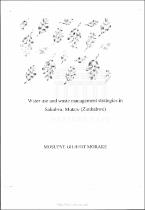Water use and waste management strategies in Sakubva, Mutare (Zimbabwe)
Abstract
Following the severe drought of 1991/92, the city of Mutare embarked on a multi-million dollar water supply project. This project brought water from the Pungwe River via pipeline to the city of Mutare. The project was deemed to be a satisfactory solution to the water and sanitation problems in Zimbabwe's third largest city. For residents of Sakubva township, the Pungwe project has ensured a supply of clean water. However, it has made very little impact in terms of accessibility to water and sanitation facilities to those same residents.
In Sakubva there are various kinds of households and forms of home ownership some with piped water and in-house toilets, but many more dependent on communal ablution blocks and open-access standpipes. Widespread dependence on communal ablution blocks in most
sections of Sakubva raises serious questions regarding equity of access to freshwater and clean sanitation facilities. At the same time, City Council and Government's reluctance to deal effectively with these issues compromises the concept of water demand manatgement as
encompassed in the Zimbabwean National Water Act of 1998. Moreover, a combination of overcrowding in Sakubva and the high mobility of its 'resident' population has negatively impacted on planning, provision and management of water and sanitation services. As a generality, there is lack of effective participation by all stakeholders, particularly women and the disadvantaged in water resources management. This compounds the general lack of social and environmental justice arising from poor governance.
Rapid and unplanned urbanization in Sakubva is compounding waste management problems. Lack of financial resources is the main problem in provision of waste management services in most developing countries. Although the same problem applies in Sakubva and Mutare the City Council is doing little to deal with waste management and this poses a serious health threat to the residents of Sakubva. The study concludes by looking at alternative water and waste management strategies thot may be employed in Sakubva. Moreover, the researcher believes that lessons from and suggestions for Sakubva may be extended to other high-density areas throughout the Southern African region, so offering region-wide policy recommendations.

